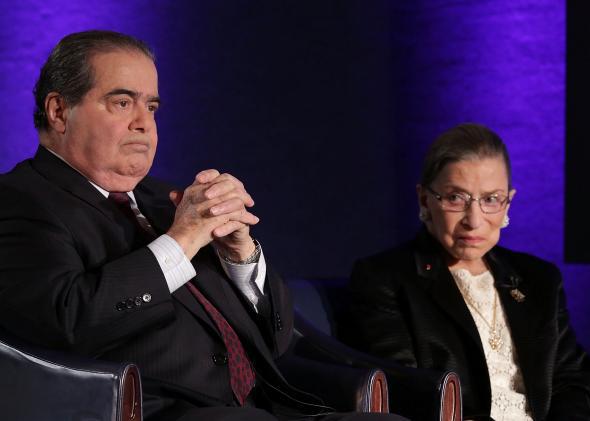Shortly after the Supreme Court announced that it would hear a case that could legalize marriage equality across the country, Bryan Fischer of the American Family Association—a certified hate group—made an announcement. Justices Ruth Bader Ginsburg and Elena Kagan must recuse themselves from the upcoming case, Fischer claimed, because they have both performed same-sex marriage ceremonies. These recusals would strip the liberal bloc of two key votes, likely guaranteeing a 4-to-3 vote against marriage equality.
The recusal game is a dangerous one to play, and liberals soon struck back with a pointed rejoinder. During this year’s anti-abortion “March for Life” rally, Robert P. George and Ryan T. Anderson met with Justice Clarence Thomas, and Thomas complimented Anderson on his “Choose Life” tie. In case you’ve forgotten, George and Anderson are co-authors of the kinkiest, freakiest anti-gay marriage treatise ever penned. George is also the co-founder of the viciously homophobic National Organization for Marriage, while Anderson currently serves as a Heritage Foundation staffer. By palling around with these activists, liberals argued, Thomas has conceded his partiality in the gay marriage cases and should recuse himself.
If Ginsburg, Kagan, and Thomas took all this advice to heart, we’d probably have a 3-to-3 deadlock, which would affirm the 6th Circuit’s decision against marriage equality. But that’s not why the justices should ignore calls for recusals. There’s a much bigger issue at stake here: our willingness to trust justices to rule impartially regardless of their friendships, morals, or politics. If we can’t trust Kagan and Ginsburg to rule fairly on a gay marriage case just because they’ve performed same-sex weddings, then we shouldn’t trust Catholic justices to rule on cases involving Catholic religious freedom—nor should we trust black justices to rule on cases involving equal protection for blacks. And if we can’t trust Thomas to rule dispassionately here, then we shouldn’t trust any justice to rule in a case supported by groups (like the ACLU or the Federalist Society) with whom they associate.
This extreme standard would reflect a disturbing cynicism about the integrity of the court itself. But, even more important, it would be utterly unworkable. The justices are real humans who have real beliefs and real lives, and their legal and personal associations frequently have political overtones. And that is entirely OK. We all know Thomas opposes the constitutional case for gay marriage, and we all know Kagan and Ginsburg support it. There’s no point in pretending otherwise or in trying to game the vote by pressuring a certain justice into recusal. The justices are honorable people. If they felt their personal or financial connections could truly sway their votes, they would recuse themselves. Demanding recusals in blockbuster cases will only encourage Americans to question the legitimacy of the final ruling.
I understand, though, that my argument amounts to little more than blind trust. And that is the real problem here. At the moment, the justices get to decide for themselves when recusal is warranted, and they rarely explain their reasoning. This surrounds the recusal issue with an unnecessary opacity that only stirs leery skepticism. Further, when justices do recuse themselves, they put this bitterly divided court at risk of a 4-to-4 decision, which simply reaffirms the lower court’s ruling and wastes everybody’s time.
Clearly, these are real difficulties for the court. But they could be solved felicitously with a lot of transparency and a little pragmatism. Erwin Chemerinsky, dean of the University of California–Irvine School of Law and a frequent Supreme Court advocate, has proposed two brilliant and simple solutions. First, a panel of federal court of appeals judges should be designated to rule on each recusal motion, ending the practice of leaving the justices to decide for themselves when recusal is warranted. Second, when a justice is recused, a retired justice should be chosen at random to participate in his or her stead.
Under these rules, I am confident almost nothing would change about how often justices are recused. But at least the public would have a bit more confidence in the integrity of the court—and, crucially, yammerers like Bryan Fischer wouldn’t be able to impugn that integrity so easily. Of course, given the justices’ obstinate resistance to any kind of change, Chemerinsky’s dream won’t become reality any time soon. We’ve got to pick our battles. And, to my mind, shining a light on the justices’ process of choosing which cases to hear is much more important than the recusal crusade.
Want to hang out with Outward? If you’ll be in or near New York City on Feb. 3, join June Thomas, J. Bryan Lowder, and Mark Joseph Stern—and special guest Lea DeLaria of Orange Is the New Black fame!—for a queer kiki at the first ever Outward LIVE show, hosted by City Winery. Details and tickets can be found here.
